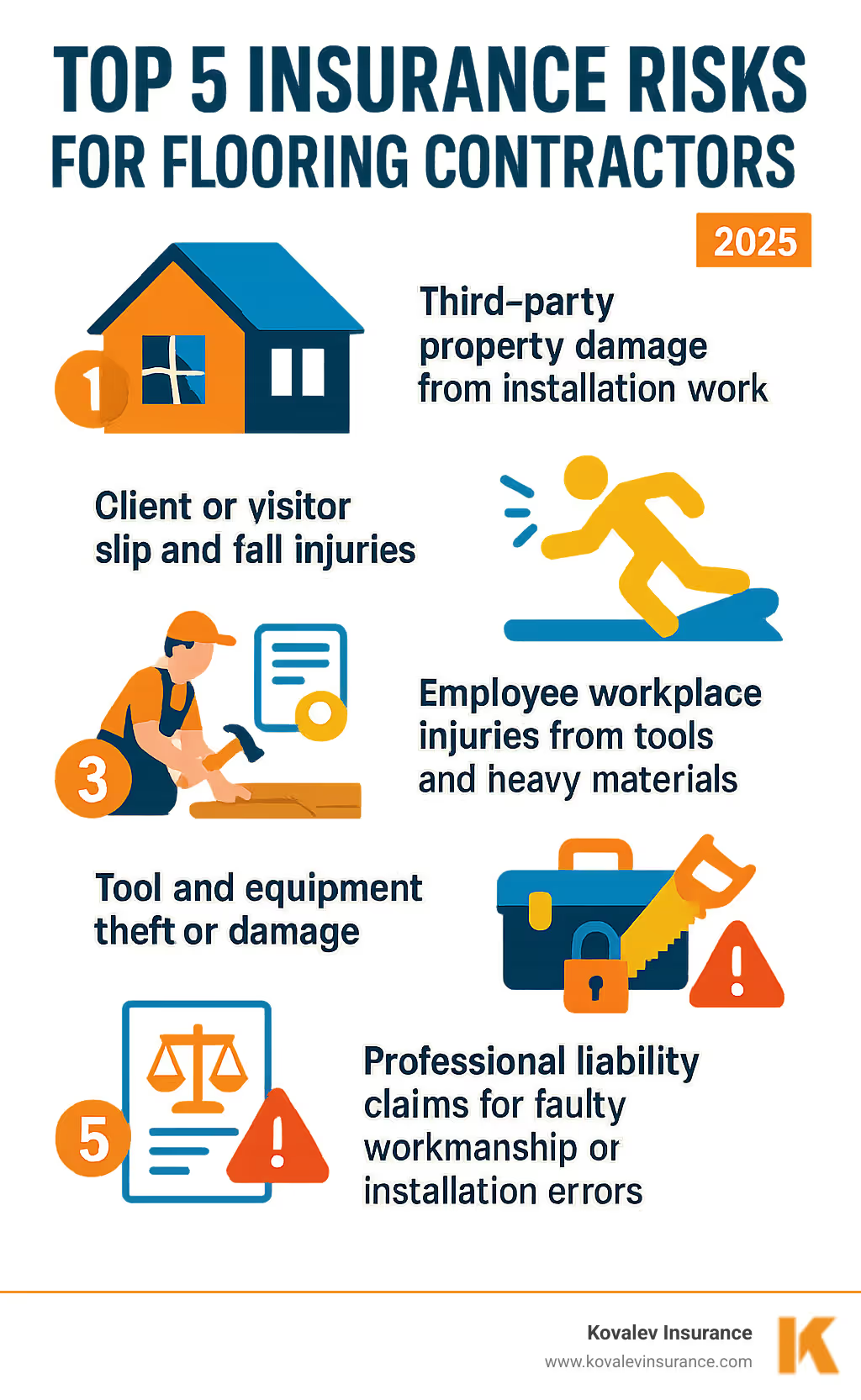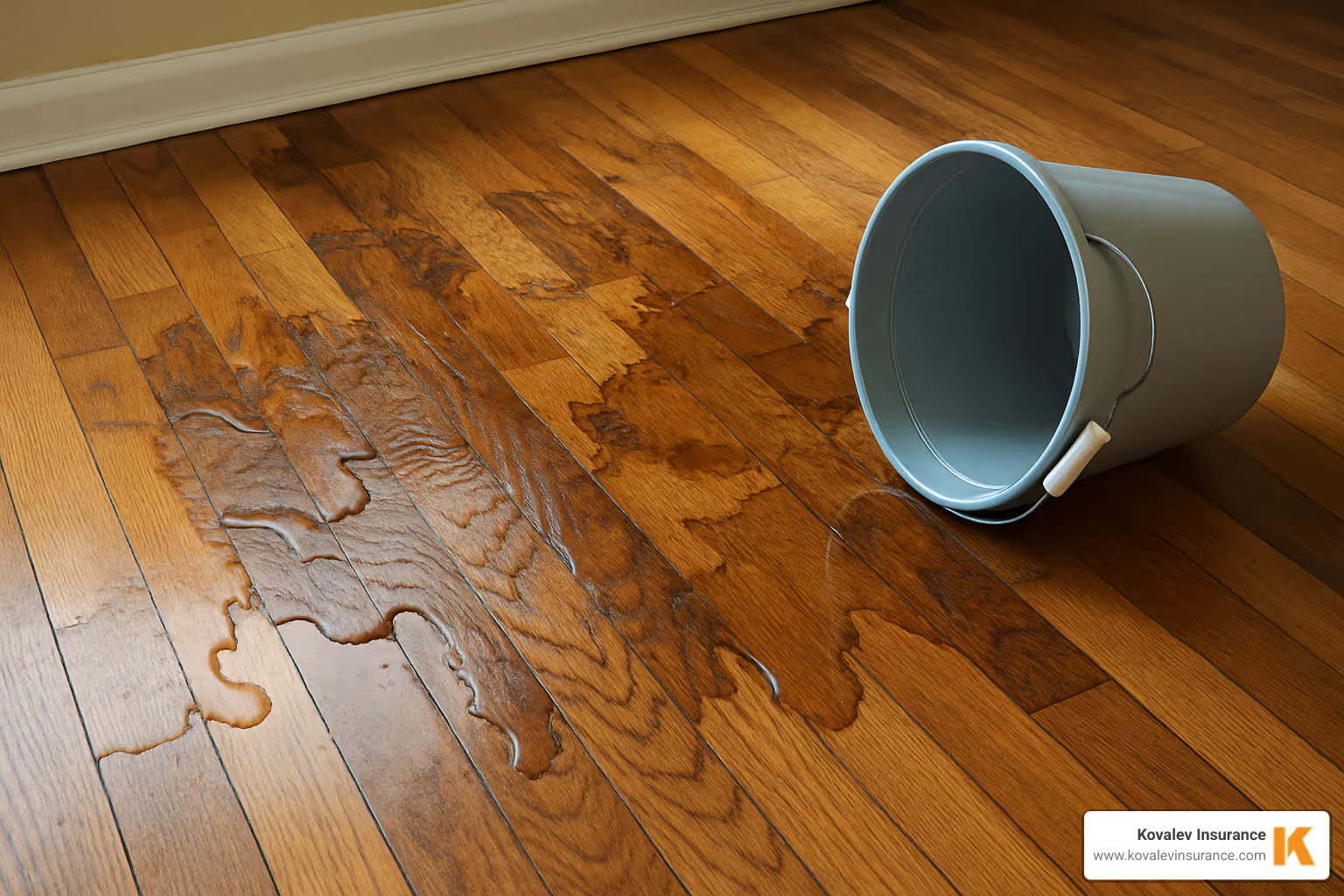Blog Content
26
Sep
2025

Flooring installer insurance protects your business from the high-liability risks that come with working in clients' homes and commercial spaces. Whether you're installing hardwood in Newton or laying tile in Wellesley, one accident can cost thousands in damages and legal fees.
Essential Coverage for Flooring Installers:
Installing floors in homes and offices means high liability exposure. As one industry expert puts it: "Working with tools in other people's homes and offices means high liability. Business insurance helps pay legal costs if a client trips on loose linoleum, or sues over damage in their home."
Common risks include:
From sole proprietors to established companies with multiple crews, every flooring contractor in Massachusetts faces these risks daily. General contractors and commercial clients routinely require proof of insurance before you can even bid on projects.
I'm Mikhail Kovalev, and over the past decade at Kovalev Insurance Agency, I've helped hundreds of Massachusetts contractors secure comprehensive flooring installer insurance policies custom to their specific needs. My team understands the unique risks facing artisan contractors across the greater Boston area, from Brookline to Natick.

Working inside someone else’s home or business always carries risk. A dropped pry-bar can gouge a $15,000 parquet, a client can slip on loose underlayment, or an employee can wrench a back lifting carpet rolls. Without coverage, any of these events could end a small company overnight.
Insurance does more than pay claims—it opens doors. General contractors across Massachusetts, from Newton to Wellesley, routinely ask for a Certificate of Insurance (COI) before you can bid. Showing that document proves you are professional, financially responsible, and ready for bigger projects. Learn more about the everyday hazards in our guide to Common Risks for Artisan Contractors in MA.

Whether you’re a sole proprietor, an LLC with a two-person crew, or a corporation running several vans, the exposures are the same. Hardwood specialists, tile setters, carpet layers, vinyl and laminate pros—all need protection. Subcontractors especially must show their own liability policy when working under a GC in Needham, Belmont, or anywhere else in the Commonwealth.

Think of insurance as the sub-floor that supports everything else you build. The following policies form the base layer every Massachusetts flooring pro should carry.
Pays for third-party bodily injury, property damage, advertising injury, and completed-operations claims. Limits of $1 million/$2 million are standard and satisfy most contracts in Needham, Belmont, and surrounding towns. More detail is available in our guide to General Liability Coverage in Massachusetts.
Legally required for any business with employees—even one part-timer. It covers medical bills, lost wages, and disability when workers suffer knee, back, or repetitive-motion injuries. Premiums usually run $4–$5 per $100 of payroll for flooring classifications. See Worker's Compensation Insurance in Massachusetts or check state rules at the Department of Labor.
These two coverages handle the majority of claims. The next section looks at specialty policies that fill the remaining gaps.
Beyond the basics, a few add-ons protect the things that make your business run—your tools, your materials, and your wheels. Our post on Artisans & Contractors Insurance explains why tailoring matters.
Your commercial property policy stops at your shop’s four walls. These endorsements follow your gear and your customer’s materials wherever the job takes you.
Personal auto coverage excludes business use. A commercial policy covers liability, physical damage, and can add hired & non-owned protection when employees drive their own cars to pick up supplies in Newton or Natick.
E&O pays when clients allege faulty workmanship or bad advice—like the wrong moisture test leading to buckling floors. Defense costs alone can dwarf the annual premium, making this coverage a smart add-on for high-value residential or commercial work.

Premiums vary, but ballpark figures help you budget.
For tips on trimming the bill, see Ways to Reduce Artisan Insurance Costs.
Bundle two or more policies with the same carrier and you can often shave 10–25 % off those numbers.

Massachusetts doesn’t issue a flooring-only license, but other state credentials may still apply.
Gather:
Share the details with an independent agent who can shop multiple carriers. Once you choose a policy, a Certificate of Insurance is usually available within minutes—letting you start that Brookline project without delay.
Oh, absolutely! Think of it this way: almost every general contractor you work with will ask for proof of your own flooring installer insurance before you even step foot on their job site. They'll want to see your Certificate of Insurance (COI) to make sure everyone is protected. This isn't just about ticking a box; it's about making sure that if an accident happens, both you and the general contractor are covered.
But even beyond those requirements, having insurance is a smart move for your business. It protects your personal money and belongings from business-related lawsuits. Imagine a mishap on a job – a client tripping or accidental damage. Without insurance, your home, your savings, everything you've worked hard for, could be at risk. A small monthly investment in flooring installer insurance can prevent a huge financial headache down the road.
And here's a big one for Massachusetts contractors: if you ever decide to hire help, even just a part-time assistant, our state law requires you to carry Workers' Compensation insurance. So, as your business grows, this becomes a legal necessity, not just a recommendation!
A Business Owner's Policy, or BOP, is like a super-smart bundle. It takes two essential coverages—General Liability and Commercial Property insurance—and puts them together into one convenient, often discounted, policy. Think of it as getting more bang for your buck, typically saving you 10-15% compared to buying them separately.
So, is a BOP right for you? It's a fantastic option if your flooring business has a physical home base. This could be:
If you own or rent a commercial space, say a small showroom in Natick or a storage unit in Belmont, a BOP protects both your liability exposures (like General Liability) and your business property (like your computers, inventory, and even that fancy coffee maker in your office). It simplifies your insurance, putting all that protection under one roof. While the average BOP costs around $109-$239 per month, it often provides much better value and less hassle than managing multiple separate policies.
We know that in the contracting world, speed is often key! Once you've finalized and purchased your flooring installer insurance policy, you can usually get your Certificate of Insurance (COI) almost instantly. Most insurance companies, including us at Kovalev Insurance, make COIs available electronically. This means you can email or print them right away, without waiting for snail mail.
This quick access is super important because you often need a COI on short notice to:
At Kovalev Insurance, we totally get that contractors need things fast. That's why we make sure our clients can access their COIs 24/7 through our easy-to-use online portal. We want to help you get to work without delays!
Your flooring business is your livelihood, and protecting it shouldn't be left to chance. A small investment in comprehensive flooring installer insurance can prevent catastrophic financial losses that could end your career in an instant.
Think about it: you've spent years building your reputation, developing your skills, and growing your client base. One accident, one lawsuit, or one theft could wipe out everything you've worked for. That's not just a business risk—it's a threat to your family's financial security.
The flooring industry presents unique challenges that generic business insurance simply can't address. You're working with expensive materials in other people's homes, operating power tools in tight spaces, and taking responsibility for installations that need to last decades. These specific risks require custom insurance solutions designed for your trade.
Why generic coverage falls short: Standard business policies often exclude key exposures like tools in transit, materials in your care, or completed operations claims. These gaps could leave you personally liable for damages that reach into the hundreds of thousands of dollars.
An independent agent can help you steer the complexities of Construction Insurance Coverage in Massachusetts and ensure you're getting the best possible rates for comprehensive protection.
At Kovalev Insurance, we've made it our specialty to understand the ins and outs of artisan contractor insurance. Over the past decade, we've helped hundreds of flooring professionals across the greater Boston area secure the right coverage for their unique needs. From Newton to Natick, from Wellesley to Brookline, we know the specific challenges facing Massachusetts contractors.
What sets us apart: We don't just sell insurance—we build relationships. Our team takes the time to understand your business, your risks, and your budget. We work with multiple top-rated insurance carriers to find you the best combination of coverage and cost, not just the cheapest premium.
When you need a Certificate of Insurance for a job in Needham or Belmont, we make sure you can get it instantly. When you have questions about coverage, you'll speak with someone who understands your business. When it's time to file a claim, we'll be there to guide you through the process.
Our expertise includes: Specialized knowledge of Massachusetts insurance requirements, access to multiple carriers for competitive rates, fast quotes and immediate certificate access, and personalized service from experienced professionals who understand the flooring industry.
Ready to build a solid foundation of protection for your business? Get a Commercial Business Insurance Quote today and find how affordable comprehensive coverage can be.
Don't wait until it's too late. The next job could be the one where you need insurance most. Your business, your employees, and your family's financial future are worth protecting properly.
X